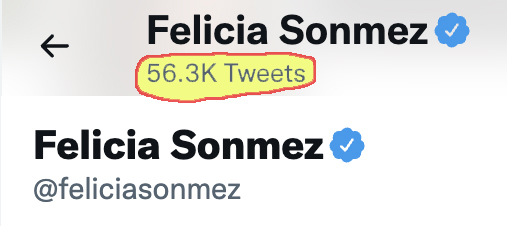Anti-social media: Felicia Sonmez and the Washington Post’s Twitter storm

Newsrooms have always been rife with staff melodrama, family feuds and gossip. (We are storytellers, after all.) I remember a really good yarn at the Chicago Tribune that involved a columnist and a bemused editor in features. One day the editor pulled me aside and gestured to a huge pile of newspapers and boxes outside the cubicle to the left of mine: a much bigger cubicle given that writer’s status.
“You know why those are there, right?” he asked.
“Because she doesn’t have enough room for them?”
“No,” he replied, and proceeded to enlighten me. “The boxes and crap are all there because she’s hoping someone trips and breaks their neck. And when the editors come over to complain, she’s going to point over there…” He pointed over there. It was an empty glass-doored office, plenty of light, plenty of privacy, nice views to the east, unoccupied for months.
“She’s going to say, ‘This wouldn’t have happened if you’d moved me in there.’”
The story was perhaps implausible, but certainly believable: You had to know the writer in question. No matter, though. Back in the day, such internecine dramas stayed in the newsroom. Short of buying a bullhorn or taking out a classified ad, there was no real way to broadcast them.
Not so, though, at the Washington Post, what with its current Twitter feud between, among and around staffers.
A sexist joke leads to a public slap
The first layer of the story involves David Weigel, a veteran Post political writer who was just suspended for retweeting a sexist joke from YouTuber Cam Harless: “Every girl is bi. You just have to figure out if it’s polar or sexual.”
That’s tasteless enough. Weigel, who returns to work July 5 according to CNN, took down the tweet immediately. Hours later, he apologized: ”I just removed a retweet of an offensive joke. I apologize and did not mean to cause any harm.”
But apparently, one of his co-workers decided that this was so egregious she took to multiple channels to vent. On Twitter, national political reporter Felicia Sonmez declared: “Fantastic to work at a news outlet where retweets like this are allowed!” (Note use of Trumpian exclamation point.) She then relayed the Harless joke, as though having it show up once on Twitter wasn’t enough.
Initially backed by colleague Jose A. Del Real, she went after him as he sought balance. Del Real tweeted, “Dave’s retweet is terrible and unacceptable. But rallying the internet to attack him for a mistake he made doesn’t actually solve anything. We all mess up in some way or another. There is such a thing as challenging with compassion.”
Enter more tweets flying across the newsroom, that darned Twitter bird carry a mix of olive branches and bird poop. For the sake of brevity I’ll leave them out. Suffice to say that Del Real (who temporarily shut off his account) later added:
“Felicia, we all mess up from time to time. Engaging in repeated and targeted public harassment of a colleague is neither a good look nor is it particularly effective. It turns the language of inclusivity into clout chasing and bullying. I don’t think this is appropriate.”
Then came this simple entreaty tweet aimed at Sonmez by Post reporter Lisa Rein:
“Please stop.”
The Post, in the Twitter storm/hurricane
As other staffers jumped into the fray, the Post has been forced to cover the whole sordid Tweetstorm. In its June 7 story, the lead paragraph read: “Washington Post Executive Editor Sally Buzbee warned employees Tuesday against ‘attacking colleagues either face to face or online’ in a memo she said was meant to reinforce the need for collegiality.”
Could this call for collegiality be more timely — and timeless? One complicating factor is that Buzbee, in the job for a year, hasn’t come down definitively on what is and isn’t acceptable online conduct. To be fair, that’s a conundrum pretty much everywhere. In April, outgoing New York Times executive editor Dean Baquet told his staff:
We can be overly focused on how Twitter will react to our work, to the detriment of our mission and independence. We can make off-the-cuff responses that damage our journalistic reputations. And for too many of you, your experience of Twitter is shaped by harassment and attacks.”
As this translates with the current Twitter storm: Post haters on the right now have a celebratory, salivatory, raw-meat excuse to pounce on reporters’ feeds. Here’s one from Jon Nicosia: “Kidding aside, watching liberals in newsrooms just lay in wait to destroy their colleagues is…delicious.”
Would you blame them? Not me. Would you trust a reporter acting in such an unbridled way to effectively, objectively cover national politics?
I thought so.
That a journalist working on such a prominent stage would be blind to the terrible optics of her behavior, in fact relish that behavior as of this writing, stuns me. She’s doing it with heart emojis, too, and phrases like “You all rock.” Neat. Say what you want about Tucker Carlson, and I’ve said plenty here about that freaking loose cannon. But he knows enough to steer clear of the seventh grade Twitter stuff.
Twitter brain science meets tweeting lack of brains
Here’s the thing: Brain science teaches us that with every tweet — and so many are impulsive — we squirt little jets of dopamine into our brains. It’s too often a quick hit and a quick hit job, much more friendly to our reptile brains than the cerebral cortex that distinguishes us from animals.

In terms of sheer volume, Sonmez has dished out 56,300 tweets, according to Twitter. Conservatively assuming two minutes per tweet, that’s close to 80 days of her life she can’t get back. If time is money, she’s burned through slightly more than a year of working-week days. As my Italiano brother from South Jersey would say, “Dat stuff adds up, ya know whad I’m sayin’?”
Sonmez has raised a legitimate point, maybe. Among others, Post video tech Breanna Muir praised Sonmez for “speaking out against harassment, discrimination and sexism.” But Sonmez, I contend, did so in an undisciplined, unbecoming way given her job and status. I’m sorry to say (but not really) that she must be missing a nice chunk of brain real estate if she’s unaware of phenomena such as cancel culture and web-based shaming of every stripe, waters she has dragged Weigel into.
Put something strident and angry out there — with an exclamation point no less! — and people are bound to pile on and pulverize. Happens every damn day. And free speech, wouldn’t ya know, should be brandished as responsible speech in our profession. For Sonmez to miss these points gives every person who ever hated the media yet another reason to hate us, as a group and as individuals: her Post colleagues, people she actually works with.
Sonmez, shaming on steroids
This also raises crucial questions of overstepping the bounds of civility. Again: If she exercised free speech, Sonmez also abused it. She not only humiliated a co-worker but also the employer that pays her bills, damaging the reputation of a storied news outlet. She turned an internal matter into something newsworthy in the worst possible way.
I’m not one to excuse crude conduct. Any reporter under my watch who committed Weigel’s blunder would’ve met the same fate as the Post doled out: a month without pay. As you can no doubt appreciate, such a penalty on a journalist’s salary — what with gas approaching fifty bucks a gallon and inflation a SpaceX rocket — is a big blow to sustain. If Weigel makes $100,000 a year, typical for his position, by my reckoning he just lost more than $8,000.
And yet, one wrong does not imply a right response. Sonmez’ conduct is such an obvious non-starter that even a guest host on“The View” has handed her a can of whoop-ass. As journalist Lindsey Granger (she of “Daily Beast Live” renown) said on the June 8 show:
This always gets lost on me, that people insert themselves and make themselves the story when that’s the number one thing you’re taught not to do.”
But maybe that’s what Sonmez wants to do. In March, her discrimination lawsuit against the paper was dismissed — a decision her attorney has said she plans to appeal. Certainly, it’s tricky stuff. Sonmez cried foul because, having been outspoken about being a sexual assault survivor, she was prohibited from covering sexual misconduct stories. But was she singled out in some unfair way? I was prohibited from interviewing record producers at the Tribune because I was one, the feeling being my coverage would lack objectivity. I fumed, but years later realized it was the right call.
So Sonmez is no stranger to controversy. But the question is: Having compounded the Weigel situation into something that has cast an unflattering spotlight on the Post and her coworkers, should Buzbee consider yet another suspension?
Just askin’. I know what I’d do, let’s say.
Meanwhile, chew on this: Sonmez herself was placed on administrative leave; she came under fire in 2020 for a tweet she posted about Kobe Bryant, just hours after his death. It linked to a 2016 story detailing rape allegations against the NBA superstar. The irony? Weigel was one of the reporters who most staunchly supported her.
Heady stuff, and perhaps good supporting evidence for why the Post took Sonmez off stories of sexual misconduct. The Bryant tweets resulted in death threats and piling on; David Weigel came to her defense at a very sensitive time.
Too bad, and too tone deaf, that Felicia Sonmez couldn’t at least partially return the favor. But hey, she’s made herself into one helluva story. And hey, you gotta love it. (Insert heart emoji here.)
Lou Carlozo is Qwoted’s editor in chief. All opinions expressed are not shared on his Twitter account, which has been mostly inactive for a decade. Email lou@qwoted.com or connect on LinkedIn.
POPULAR POSTS
LATEST ARTICLES
CATEGORIES
